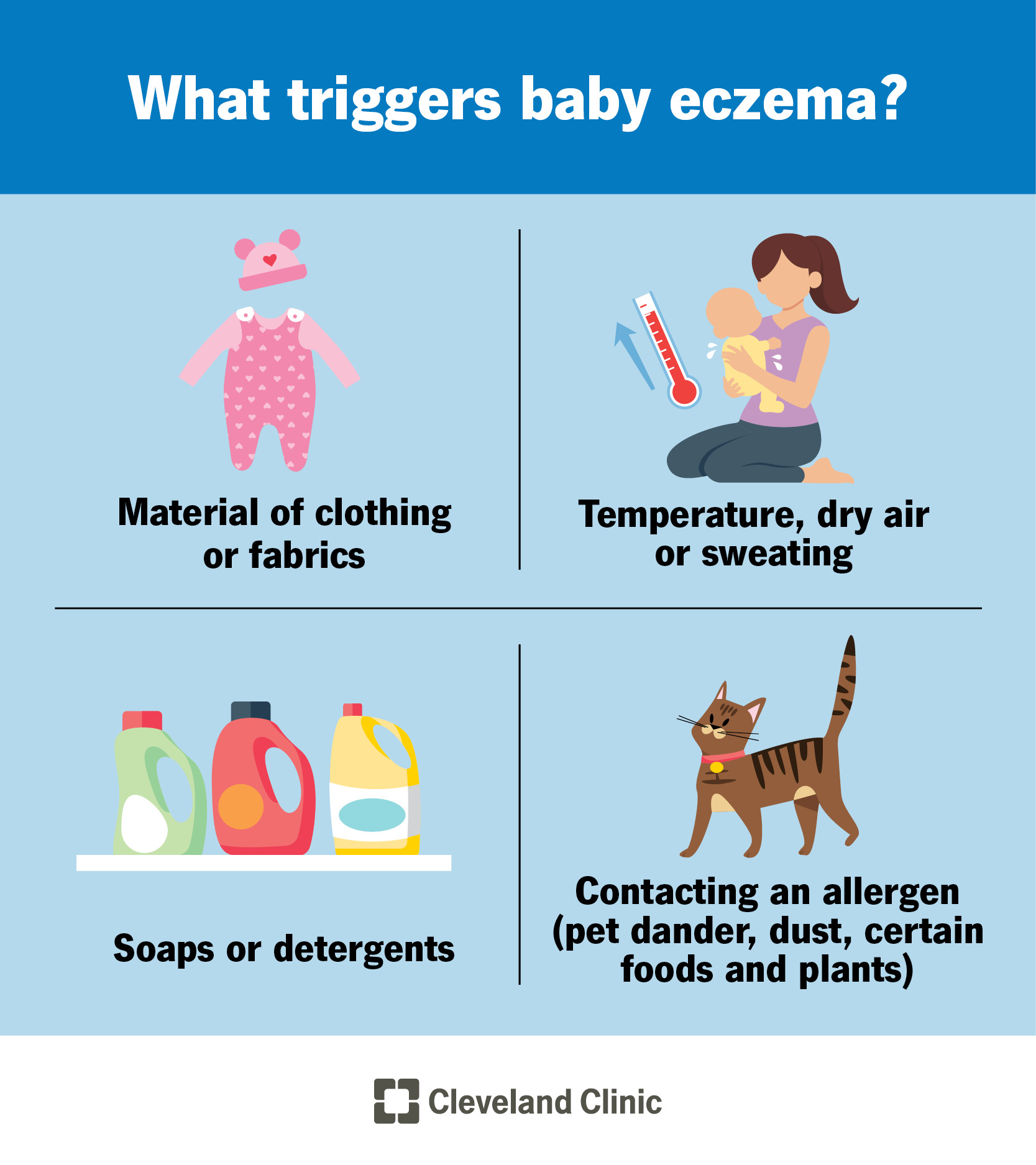Eczema can be a frustrating and uncomfortable condition for anyone, but when it affects babies, it can be especially challenging. Seeing your little one go through the red, itchy patches can leave you feeling helpless. That’s why understanding how to handle and treat eczema in babies becomes essential. From identifying triggers to implementing a gentle skincare routine, this article will provide you with practical tips and advice to help alleviate your baby’s discomfort and manage eczema effectively.
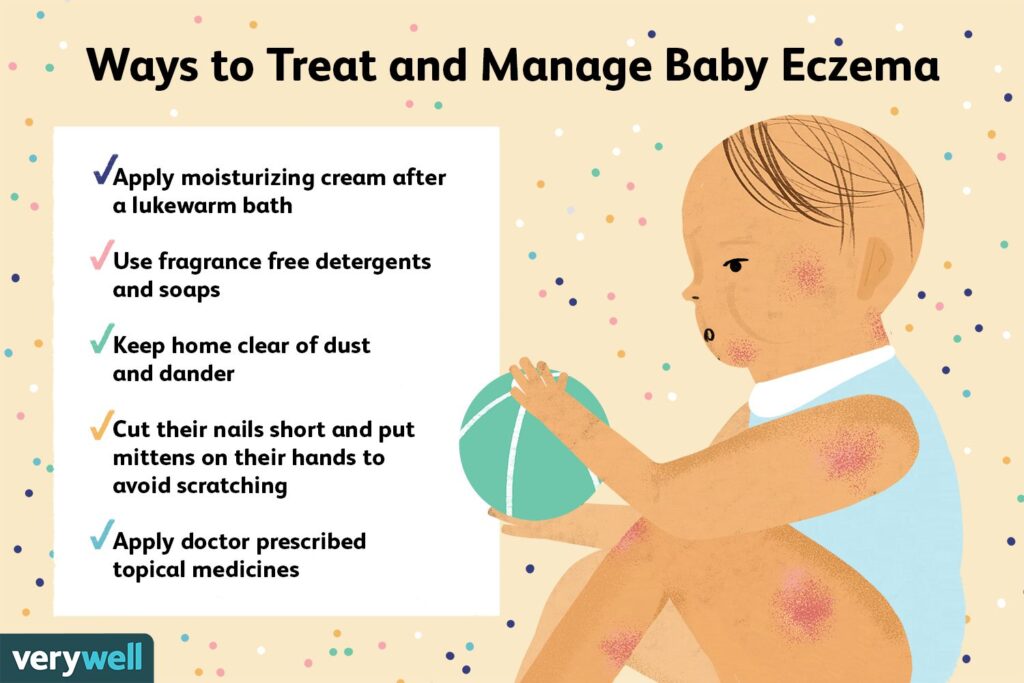
Causes of Eczema in Babies
Heredity
Eczema, also known as atopic dermatitis, can have a genetic component. If you or your partner have a family history of eczema, your baby may be more susceptible to developing the condition. It is important to be aware of this hereditary factor and take necessary precautions to prevent flare-ups.
Environmental factors
Environmental factors can play a role in triggering eczema in babies. Exposure to certain allergens, such as dust mites, pet dander, or pollen, can cause an allergic reaction and lead to eczema symptoms. It is essential to identify these triggers and minimize your baby’s exposure to them to reduce the risk of flare-ups.
Irritants and allergens
Irritants and allergens in your baby’s surroundings can also contribute to their eczema. Common irritants include strong soaps, detergents, and harsh fabrics. Allergens can vary from person to person but may include certain foods, such as cow’s milk or eggs. Identifying and avoiding these irritants and allergens is crucial for managing your baby’s eczema.
Immune system dysfunction
Eczema is often associated with a dysfunction in the immune system. In babies with eczema, their immune system may overreact to certain environmental triggers, leading to inflammation and skin irritation. Understanding this immune system dysfunction can help you better manage your baby’s eczema and minimize flare-ups.
Dry skin
One common cause of eczema in babies is dry skin. When the skin is dry, it becomes more susceptible to irritation and inflammation, making it easier for eczema to develop. Keeping your baby’s skin moisturized is crucial in preventing dryness and reducing the chances of eczema flare-ups.
Common Symptoms of Eczema in Babies
Red or inflamed skin
One of the most noticeable symptoms of eczema in babies is red or inflamed skin. You may notice areas of your baby’s skin turning red, and these areas may feel warm to the touch. This redness can be an indication of the immune response and inflammation associated with eczema.
Itching and scratching
Eczema often causes intense itching, which can be distressing for babies. You may notice your baby scratching at their skin or rubbing it against surfaces to relieve the itchiness. It is important to discourage excessive scratching, as it can worsen the symptoms and potentially lead to skin infections.
Dry and cracked patches
Another common symptom of eczema in babies is the presence of dry and cracked patches on the skin. These patches may appear rough and scaly. The skin in these areas may also feel rough to the touch. Keeping the skin moisturized is essential in preventing and alleviating these dry patches.
Small bumps or blisters
In some cases, eczema can manifest as small bumps or blisters on the skin. These bumps may be filled with fluid and can be itchy or painful for your baby. It is important not to pop or scratch these blisters, as it can lead to further irritation and potential infections.
Thickened or scaly skin
With ongoing eczema flare-ups, your baby’s skin may become thickened or develop a scaly texture. This occurs due to the excess build-up of skin cells and the inflammation associated with eczema. Proper skincare and management can help minimize the thickening and scaling of the skin.
Diagnosing Eczema in Babies
Medical history review
When diagnosing eczema in babies, the pediatrician will begin by conducting a review of your baby’s medical history. They will ask you questions about your baby’s symptoms, the duration of the symptoms, and any potential triggers or family history of eczema. Providing accurate and detailed information will assist the pediatrician in making an accurate diagnosis.
Physical examination
After reviewing the medical history, the pediatrician will conduct a physical examination of your baby’s skin. They will examine the affected areas, looking for signs of redness, inflammation, dry patches, and other characteristic symptoms of eczema. This visual examination is crucial in determining the presence and severity of eczema.
Allergy testing
In cases where your baby’s eczema is suspected to be triggered by specific allergens, the pediatrician may recommend allergy testing. This can help identify potential triggers and guide you in implementing appropriate avoidance measures. Allergy testing can be done through blood tests or skin prick tests, depending on the age and needs of your baby.
Skin biopsy
In rare cases where the diagnosis is not clear or if there is uncertainty regarding the underlying cause of the skin condition, a skin biopsy may be recommended. During a skin biopsy, a small sample of skin is taken for laboratory analysis. This analysis can provide valuable insights into the nature of the skin condition and aid in making an accurate diagnosis.
Preventing Eczema Flare-ups in Babies
Keep the skin moisturized
One of the key ways to prevent eczema flare-ups in babies is to keep their skin moisturized. Regularly applying a gentle, hypoallergenic moisturizer can help lock in moisture and prevent dryness. It is important to choose moisturizers specifically formulated for babies and avoid products that contain potential irritants or allergens.
Avoid triggers
Identifying and avoiding triggers is crucial in preventing eczema flare-ups. Pay attention to your baby’s environment and observe any patterns or reactions. If certain fabrics, detergents, or foods seem to aggravate your baby’s eczema, make an effort to eliminate or minimize their exposure to these triggers.
Choose gentle, fragrance-free products
When it comes to baby skincare products, it is essential to choose gentle, fragrance-free options. Harsh soaps, shampoos, and lotions can strip the skin of its natural oils and exacerbate eczema symptoms. Opt for mild and hypoallergenic products that are specifically designed for sensitive skin.
Dress your baby in breathable clothing
The clothing your baby wears can also contribute to their eczema. Avoid tight, restrictive clothing and opt for loose-fitting, breathable fabrics like cotton. These fabrics allow air circulation and can help prevent excessive sweating and irritation.
Maintain a comfortable indoor environment
The indoor environment can significantly impact your baby’s eczema. Maintaining a comfortable humidity level and avoiding extreme temperature changes can help prevent skin dryness and irritation. Consider using a humidifier during the dry winter months to add moisture to the air.
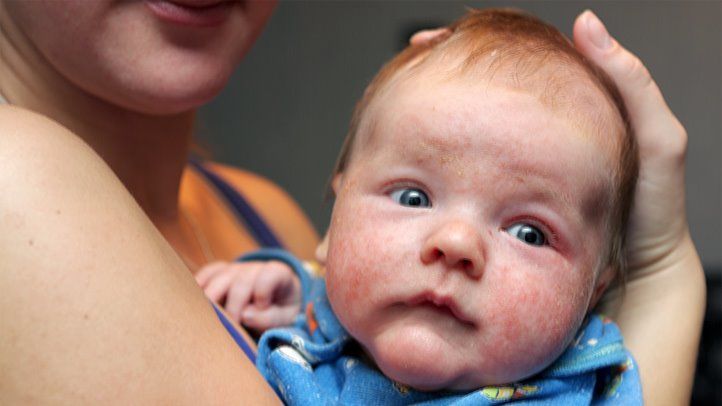
Over-the-Counter Treatments for Eczema in Babies
Hydrocortisone creams
Hydrocortisone creams are a common over-the-counter treatment for eczema in babies. These creams contain a low-concentration corticosteroid that helps reduce inflammation and relieve itching. However, it is essential to use these creams cautiously and as directed by the healthcare provider to avoid overuse and potential side effects.
Moisturizers and emollients
Regularly applying moisturizers and emollients is an important part of managing eczema in babies. These products help hydrate and protect the skin, reducing the risk of flare-ups. Look for products specifically formulated for sensitive skin and free of potential irritants or allergens.
Topical antihistamines
Topical antihistamines may be used in some cases to provide temporary relief from itching and discomfort. These creams or ointments contain antihistamine ingredients that work by blocking histamine receptors in the skin. However, it is important to consult with a healthcare provider before using topical antihistamines on your baby.
Oatmeal baths
Oatmeal baths can be soothing for babies with eczema. Colloidal oatmeal, finely ground oats, is added to warm bathwater to create a milky solution. This solution can help alleviate itching and reduce inflammation. Ensure the bathwater is lukewarm and avoid prolonged bathing, as excessive water exposure can worsen dryness.
Wet wrap therapy
Wet wrap therapy involves applying a moisturizer to the skin and then covering it with damp cloth or bandages. This technique helps lock in the moisture and provides a barrier to prevent scratching and further irritation. Wet wrap therapy can be particularly beneficial for babies with severe eczema and is typically done under the guidance of a healthcare professional.
Prescription Medications for Eczema in Babies
Topical corticosteroids
In cases where over-the-counter treatments are not sufficient to manage eczema symptoms, healthcare providers may prescribe topical corticosteroids. These medications are stronger than their over-the-counter counterparts and work by reducing inflammation and suppressing the immune response. It is important to follow the prescribed dosage and usage instructions carefully.
Calcineurin inhibitors
Calcineurin inhibitors are a class of medications that can be prescribed to babies with eczema. These medications work by suppressing the immune response and reducing inflammation. They are particularly useful for treating eczema on delicate areas of the skin, such as the face and genitals. Usage should be closely monitored under professional guidance.
Topical phosphodiesterase-4 inhibitors
Topical phosphodiesterase-4 (PDE4) inhibitors are another class of medications used to treat moderate to severe eczema. These medications work by reducing inflammation and itchiness. They are typically prescribed for short-term use and should be applied as directed by a healthcare provider.
Oral antihistamines
Oral antihistamines may be prescribed in some cases to help manage severe itching and discomfort caused by eczema. These medications work systemically to block histamine receptors and reduce allergic reactions. It is important to consult a healthcare provider before administering oral antihistamines to your baby.
Systemic corticosteroids
In rare cases of severe eczema that does not respond to other treatments, healthcare providers may prescribe systemic corticosteroids. These medications are taken orally or via injection and work throughout the body to reduce inflammation and suppress the immune response. Systemic corticosteroids are typically used as a last resort and under close medical supervision.
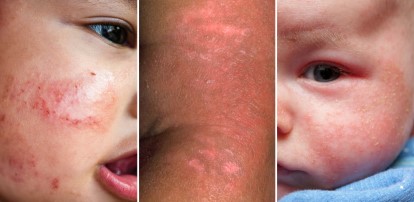
Natural Remedies for Eczema in Babies
Coconut oil
Coconut oil is a natural remedy that can be beneficial for babies with eczema. Its moisturizing and antimicrobial properties can help soothe the skin and reduce inflammation. However, it is important to patch test coconut oil on a small area of your baby’s skin before widespread use, as some individuals may be sensitive or allergic to it.
Aloe vera
Aloe vera gel, extracted from the leaves of the aloe vera plant, can provide soothing relief for eczema symptoms. Its anti-inflammatory properties help reduce redness and itching. When using aloe vera, ensure it is pure and free from added fragrances or chemicals that may irritate your baby’s skin.
Colloidal oatmeal
Colloidal oatmeal is finely ground oats that can be used in bathwater or applied topically to ease eczema symptoms. It forms a protective barrier on the skin, locks in moisture, and reduces inflammation. Look for specific products containing colloidal oatmeal or grind oats into a fine powder for use.
Chamomile
Chamomile has calming and anti-inflammatory properties that can provide relief for eczema symptoms. Chamomile tea can be brewed and then added to bathwater for soothing baths. Additionally, chamomile creams or ointments can be applied topically to reduce inflammation and itching.
Probiotics
Probiotics, which are beneficial bacteria, have been studied for their potential benefits in managing eczema. Some research suggests that probiotics may help modulate the immune system and improve eczema symptoms. It is important to consult with a healthcare provider before introducing probiotics to your baby’s diet.
Eczema Triggers to Avoid for Babies
Pollen and pet dander
Pollen and pet dander are common allergens that can trigger eczema in babies. Minimize your baby’s exposure to these triggers by keeping windows closed during high pollen seasons and regularly cleaning your home to reduce pet dander.
Harsh soaps and detergents
Harsh soaps and detergents can strip the skin of its natural oils and worsen eczema symptoms. Opt for mild, fragrance-free products when bathing your baby and doing laundry. Look for products specifically labeled for sensitive skin or recommended by dermatologists.
Tight and synthetic clothing
Tight and synthetic clothing can trap moisture and heat, leading to increased sweat and irritation. Dress your baby in loose-fitting, breathable fabrics like cotton to minimize the risk of eczema flare-ups. Avoid clothing with rough seams or tags that can rub against the skin.
Sweat and overheating
Excessive sweating and overheating can worsen eczema symptoms. Keep your baby cool and comfortable by dressing them in breathable clothing and avoiding overdressing. Ensure that your baby’s sleeping environment is adequately ventilated to prevent overheating.
Certain foods
In some cases, certain foods can trigger or worsen eczema symptoms in babies. Common culprits include cow’s milk, eggs, peanuts, and soy. If you suspect that specific foods may be contributing to your baby’s eczema, consult with a healthcare provider or an allergist for appropriate testing and guidance.
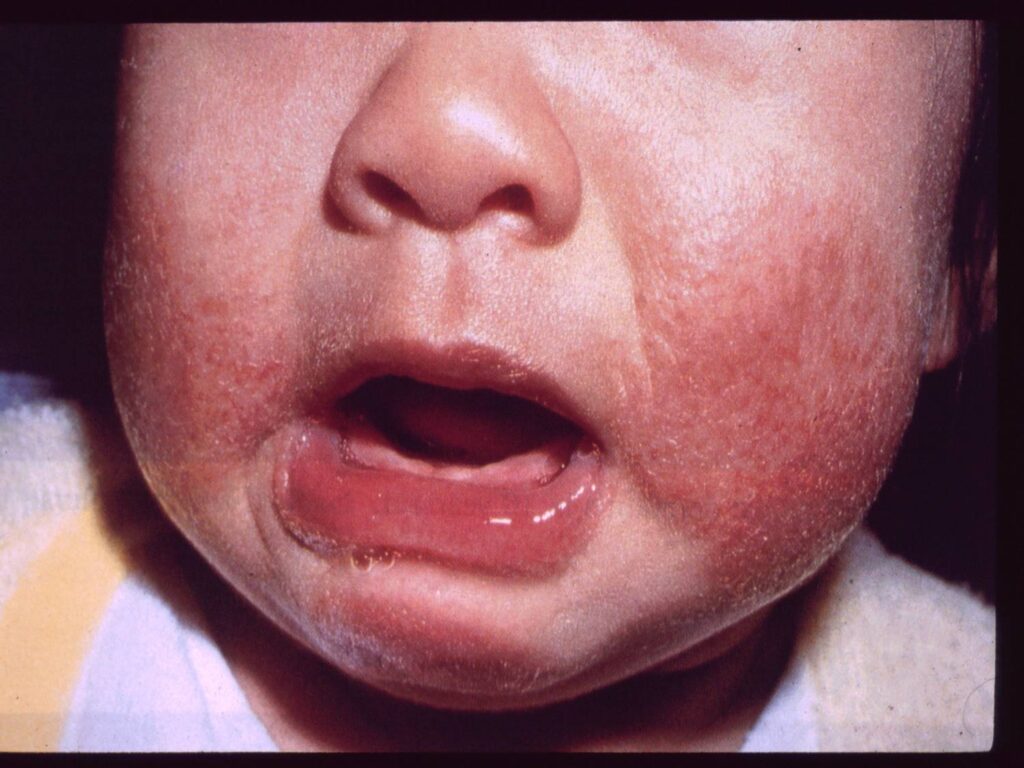
Caring for Your Baby’s Eczema
Keep nails short
Keeping your baby’s nails short is important to prevent scratching and potential skin damage. Trim their nails regularly and consider using soft nail filers to smooth any sharp edges. By doing so, you can help minimize the risk of further irritation and potential infections.
Give lukewarm baths
Lukewarm baths can help soothe your baby’s eczema-prone skin. Avoid using hot water, as it can further dry out the skin. Keep bath time short and consider adding natural remedies like colloidal oatmeal or chamomile tea for added relief.
Use soft towels and pat dry
After bathing your baby, gently pat the skin dry with a soft towel, avoiding any rough rubbing. Patting instead of rubbing helps prevent further irritation and protects the skin’s moisture. Using a soft towel ensures a comfortable experience for your baby.
Emphasize gentle skincare routines
When caring for your baby’s eczema-prone skin, it is important to follow gentle skincare routines. Avoid harsh soaps, abrasive scrubbing, and excessive use of washcloths. Instead, opt for gentle cleansers and moisturizers that are specifically formulated for sensitive skin.
Offer distraction during itch episodes
During episodes of intense itching, distract your baby with soothing activities or toys to redirect their focus. Distraction can help reduce their urge to scratch and minimize potential skin damage. Engaging in interactive play or reading a favorite book can be effective in diverting their attention away from the itch.
When to Consult a Pediatrician
Severe symptoms
If your baby experiences severe eczema symptoms, such as severe itching, intense redness, or oozing blisters, it is important to consult a pediatrician. They can assess the severity of the condition and provide appropriate medical intervention.
No improvement with home remedies
If your baby’s eczema does not improve with home remedies and over-the-counter treatments, it is advisable to seek medical advice. A healthcare provider can evaluate the situation, suggest alternative treatments, or recommend prescription medications that may be necessary to manage your baby’s condition.
Signs of skin infection
If you notice signs of a skin infection, such as increased redness, warmth, pain, swelling, or pus-filled vesicles, it is crucial to consult a healthcare provider promptly. Skin infections can occur as a result of excessive scratching or due to the open sores caused by eczema. Prompt medical attention is necessary to prevent complications.
Concerns about allergies
If you suspect that your baby’s eczema is triggered by allergies or if they have a history of allergies, it is important to discuss your concerns with a healthcare provider. They can conduct allergy testing and provide guidance on allergen avoidance or recommend appropriate allergy management strategies.
Impact on sleep or daily activities
If your baby’s eczema significantly impacts their sleep or daily activities, it is essential to consult a healthcare provider. Sleep disturbances due to itching can affect their overall well-being. Addressing the impact of eczema on your baby’s quality of life is important for their comfort and development.
Remember, every baby’s experience with eczema is unique, and what works for one baby may not work for another. It is important to consult with a healthcare provider for an accurate diagnosis and appropriate treatment plan tailored to your baby’s individual needs. With proper care, management, and a supportive healthcare team, you can help your baby live comfortably with eczema.
